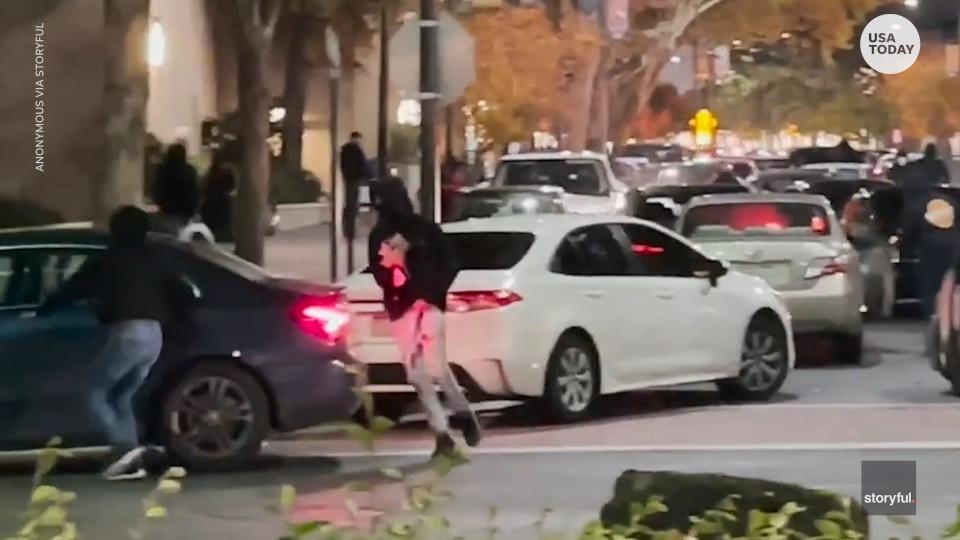After Nordstrom robbery in San Jose, will other retailers be next? Experts say yes.
A wave of brazen thefts at luxury and department stores such as Louis Vuitton and Nordstrom coincides with a nationwide rise in organized retail crime.
A majority of retailers said that stores are increasingly being targeted and that attacks have become more violent since the COVID-19 pandemic began, according to the National Retail Federation, the world's largest retail association, headquartered in Washington, D.C.
With the most popular Christmas shopping period kicking off this week with Black Friday, many retailers are concerned they could be in store for similar attacks to those seen over the past week.
On Sunday, police in San Jose, said a group of at least four people stole $40,000 of items from a Lululemon store, The Mercury News reported.
On Saturday, more than 80 people stormed a Nordstrom in Walnut Creek armed with crowbars and wearing ski masks, smashing shelves, running away with bags and boxes with thousands of dollars' worth of merchandise. Police arrested three people.
The night before, a series of lootings of stores such as Burberry, Bloomingdales, Hermes and Fendi took place in San Francisco's Union Square shopping area.
And last Wednesday, more than a dozen people robbed a Louis Vuitton store in a Chicago suburb, snatching $120,000 worth of merchandise.
"Organized retail crime continues to be a serious threat to retailers across the country," said Jason Straczewski, vice president of government relations and political affairs for the National Retail Federation. "The financial impact is considerable, as these crimes not only affect retailers’ bottom lines with asset loss and store operation disruptions, but more importantly jeopardize the safety of employees and customers."
Sixty-four percent of retailers said organized retail theft has become a priority over the past five years in their companies, after store-related violence and cybercrime.
Different from stealing or looting, organized retail crime refers to professional shoplifting by crime rings that move from store to store and city to city. The FBI has estimated that losses attributed to organized retail crime could reach as much as $30 billion a year.
While the viral images from the Nordstrom robbery of bandits in getaway cars reminiscent of Hollywood movies left millions of Americans aghast, Rachel Michelin, CEO of the California Retailers Association, said the series of bold robberies were not in the least shocking to her.

"We've been dealing with this situation in California for years," Michelin said. "What's new is that we are seeing these criminal rings go from cities into the suburbs."
Michelin said organized retail crime attacks in California are more prevalent and "significantly more violent" compared with those in any other state.
Los Angeles, San Francisco/Oakland and Chicago were ranked first, second and third among cities plagued by organized retail crime in this year's National Retailers Security survey.
The other top 10 cities are: New York at No. 4, Miami at No. 5, Houston at No. 6, Atlanta at No. 7, Sacramento, at No. 8 and Baltimore at No. 9. Las Vegas and Seattle are tied for 10th.
One of the biggest challenges for law enforcement is that no federal law prevents organized retail theft, leaving a patchwork of local and state jurisdictions to investigate crimes that go well beyond state lines.
The California Highway Patrol, which oversees a specialized organized retail crime task force that works with local law enforcement, could not be reached for comment to discuss last week's Bay Area thefts.
Over the past three years, the task force has been a part of 668 investigations of organized theft resulting in 252 arrests and the recovery of more than $16.3 million in stolen merchandise.
Meanwhile, retailers are on high alert.
"Macy’s deploys both visible and plainclothed security personnel in our locations and coordinates closely with mall security, local and national law enforcement agencies in assessing risk and response," said Andrea Schwartz, senior director of external communications for Macy's Inc., one of the country's oldest department stores.
"We take these situations very seriously, as health and safety of our colleagues and customers are our top priority."
This article originally appeared on USA TODAY: Nordstrom robbery leaves luxury retailers worried they might be next

